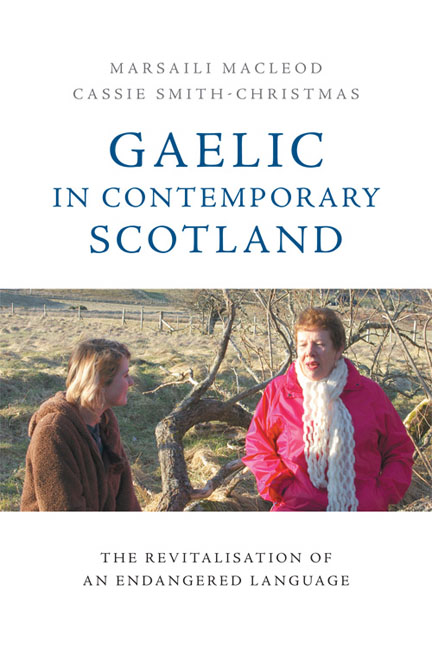Book contents
- Frontmatter
- Contents
- List of Figures
- List of Tables
- Notes on Contributors
- Foreword: Assailed yet Resolute
- Acknowledgements
- List of Abbreviations
- 1 Introduction
- 2 The Language of the Playground: Activists Building Consensus on the Language Policy and Ethos of a New Gaelic Immersion School
- 3 Mismatches between National and Local Gaelic Development: Cròileagan Dùn Èideann and the Promotion of Gaelic-medium Education
- 4 Gaelic amongst Schoolchildren: Ideas on Language Change and Linguistic Choices in Gaelic
- 5 When School is Over and Done With: Linguistic Practices and Sociodemographic Profiles of Gaelic-medium Educated Adults
- 6 New Speakers of Gaelic: A Historical and Policy Perspective
- 7 Learning Gaelic in Adulthood: Second Language Learning in Minority Language Contexts
- 8 Dlùth is Inneach: Charting Language Ideology in the Contemporary Gaelic World
- 9 Gaelic Language Use in Public Domains
- 10 Planning for Growth: The Professionalisation of the Taskforce for Gaelic Revitalisation
- 11 Organisational Language Planning: Gaelic Language Plans in the Public Sector
- 12 The Future of Gaelic Language Revitalisation in Scotland
- Index
Foreword: Assailed yet Resolute
Published online by Cambridge University Press: 18 December 2019
- Frontmatter
- Contents
- List of Figures
- List of Tables
- Notes on Contributors
- Foreword: Assailed yet Resolute
- Acknowledgements
- List of Abbreviations
- 1 Introduction
- 2 The Language of the Playground: Activists Building Consensus on the Language Policy and Ethos of a New Gaelic Immersion School
- 3 Mismatches between National and Local Gaelic Development: Cròileagan Dùn Èideann and the Promotion of Gaelic-medium Education
- 4 Gaelic amongst Schoolchildren: Ideas on Language Change and Linguistic Choices in Gaelic
- 5 When School is Over and Done With: Linguistic Practices and Sociodemographic Profiles of Gaelic-medium Educated Adults
- 6 New Speakers of Gaelic: A Historical and Policy Perspective
- 7 Learning Gaelic in Adulthood: Second Language Learning in Minority Language Contexts
- 8 Dlùth is Inneach: Charting Language Ideology in the Contemporary Gaelic World
- 9 Gaelic Language Use in Public Domains
- 10 Planning for Growth: The Professionalisation of the Taskforce for Gaelic Revitalisation
- 11 Organisational Language Planning: Gaelic Language Plans in the Public Sector
- 12 The Future of Gaelic Language Revitalisation in Scotland
- Index
Summary
Under what conditions can an endangered minority language community offer hope and a vision to its members and a programme of action that is acceptable to its fellow majoritarian citizens? This is one of the most challenging of questions in any pluralist democracy, for so much of a minority's ambition is predicated upon the majority's rec-ognition of its right to exist and, if valued, to flourish. From contemporary Catalan, to Nahuati and Yucatec Maya to Maori, the fate of minoritised languages could be taken as a temperature gauge of a society's approach to cultural diversity and the worth of human dignity.
This volume represents a very welcome synthesis of our current understanding of the social context of Gaelic. Based in large part on the research undertaken by the Soillse network it represents the current state of the art with respect to the multiple dimensions of Gaelic, but the issues raised are indicative of wider, global trajec-tories. How the contributors approach their topics and together provide evidence-based policy recommendations thus has resonance far beyond the shores of Scotland. However, we acknowledge that there are many, often contradictory or ambiguous types of evidence, so much so that decision-makers tend either to be wary of such data or select those which fit their ideological predispositions as to the role of Gaelic in society.
This innovative volume is replete with scholarly analyses, insights, critical judge-ments and pragmatic observations. The fundamental questions asked refer to mean-ings and relevance, for the speakers and their neighbours, local authorities and national political representatives. As indicated in the introductory chapter the civil society platform upon which recent language revitalisation efforts have been constructed is relatively fragmented, deeply scarred and politically rather marginal. Questions of low social prestige, the hegemonic power of English and the political rhetoric of successive Scottish administrations still act as barriers to Gaelic being considered as a universal public good in society. Thus, it is critical that newer language affiliations and practices not only provide meaning-seeking experiences but also offer a robust defence for the promotion, protection and regulation of Gaelic.
Several interlinking methodologies and threads are given substantive, empirical life in the constituent chapters. Linguistic ideologies and authority are interpreted in settings as diverse as Edinburgh schools or within the NHS Eileanan Siar Gaelic language plan.
- Type
- Chapter
- Information
- Gaelic in Contemporary ScotlandThe Revitalisation of an Endangered Language, pp. xiii - xvPublisher: Edinburgh University PressPrint publication year: 2018



